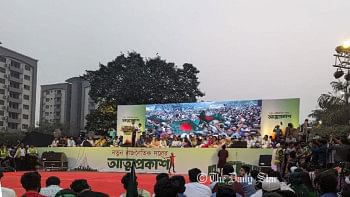Tarique Rahman and liberal politics in Bangladesh
THE senior Vice Chairman of the BNP, Tarique Rahman, recently said in London that religion based politics is not a useful mechanism for Bangladesh. He said that politics may be influenced by religion but the framework of politics must not be based on religion. This statement, at its face value, has national and international significance.
The statement came at a time when President Obama renewed America's commitment to continue the War on Terror against ISIL. Within this narrative of war, it is important for Muslim politicians to choose their sides carefully. In Egypt, the government chooses US side, in Saudi Arabia, the monarchs choose the US side, and Pakistan seems to come to terms with the US too. So it is important for Bangladeshi politicians to make their stance clear. Through the trial of the crime against humanity, Awami League (AL) made it clear that it is to be remaining in opposition of radical political Islamic force.
Given that, BNP is a key ally of almost all major Islam based parties including Jamat-e-Islami, and also that our 'liberals' were bashing BNP for the past 10 to 12 years for sharing power with Jamaat and condemning it for promoting 'radical political Islam', this statement may bring some optimism for Bangladeshi liberals.
Let's make one point clear though, AL is no less guilty of bringing conservative interpretation of religion into politics than BNP. However, the strength of AL is that they have an army of young and old liberal intellectuals who construct a rhetorical image of AL that may not be entirely true, whereas BNP's past regime did not think it to be important to maintain intellectual think tanks by forgetting the fact that it was the middle class intellectuals of Bangladesh who shaped and reshaped the idea of Bengali and Bangladeshi nation for the political parties, for Bangabandhu Sheikh Mujibur Rahman and President Ziaur Rahman, hence giving way to anti-BNP criticism.
If any one investigates the amount of finance invested by both BNP and AL governments in expansion of religious institutions and religious values through state machineries in the country, they would find that AL's spending might be as much as the BNP's. They need to look closely into the documents of Five Year Plans. Spending in religious institutions is not necessarily harmful but trying to control the ideology of political Islam is a difficult business.
A core characteristic of Islam is that it is open to interpretation in terms of socio-political and cultural application and when the state supports the growth of religious institutions and education, like ours did in case of Bangladesh under AL and BNP regimes, the state has no or few mechanisms in place to filter out radical and extreme interpretations of Islam. The burgeoning power of globalization, through its drivers such as migration, internet and discursive flows of radical ideas made this picture a complex one.
And this is exactly where conservative political Islam found leverage and they became kingmakers in Bangladesh politics. It remains a puzzle exactly why they are influential despite their low share in vote. Recent understanding, reportedly, between AL and Hefazat-e-Islami reinforces the point that political Islam sets the framework of politics in Bangladesh and there is no or little distinction between BNP and AL as none of them is secular in the truest sense of the term, they are just less or more Islamic. It may not necessarily be a bad thing considering Bangladesh's liberal Islamic culture unless these parties are harnessing Islamic parties whose interpretation of Islam may create national and even regional and global instability.
Globalization brought societies, economies and cultures into close proximity. In this new world order, local politics is global and that is why when the narrative of the War on Terror, for good or bad, was at its peak, BNP's tie with Jamaat was successfully translated by BNP detractors as the reason for supporting terrorism, and even though BNP was responsible for bringing JMB terrorists to book, the perception that BNP was a sponsor of terrorism became stronger, and they say perception is truth.
Whether Tarique Rahman meant his words in regard to politics and Islam remains to be analyzed, but considering all factors, his public statement is a step forward towards a tolerant future of Bangladesh because AL will not harness ties with Islamic parties, and if BNP too walks the same path, there is hope for a more liberal and tolerant Bangladesh.
The writer is a Doctoral Candidate, School of Government and International Relations (IR), Griffith University, Brisbane, Australia. He is also the founder of Alochonaa (www.alochonaa.com), an Australia based IR, Politics and Culture blog, run by Australian researchers and students. This is his personal opinion.

 For all latest news, follow The Daily Star's Google News channel.
For all latest news, follow The Daily Star's Google News channel. 



Comments